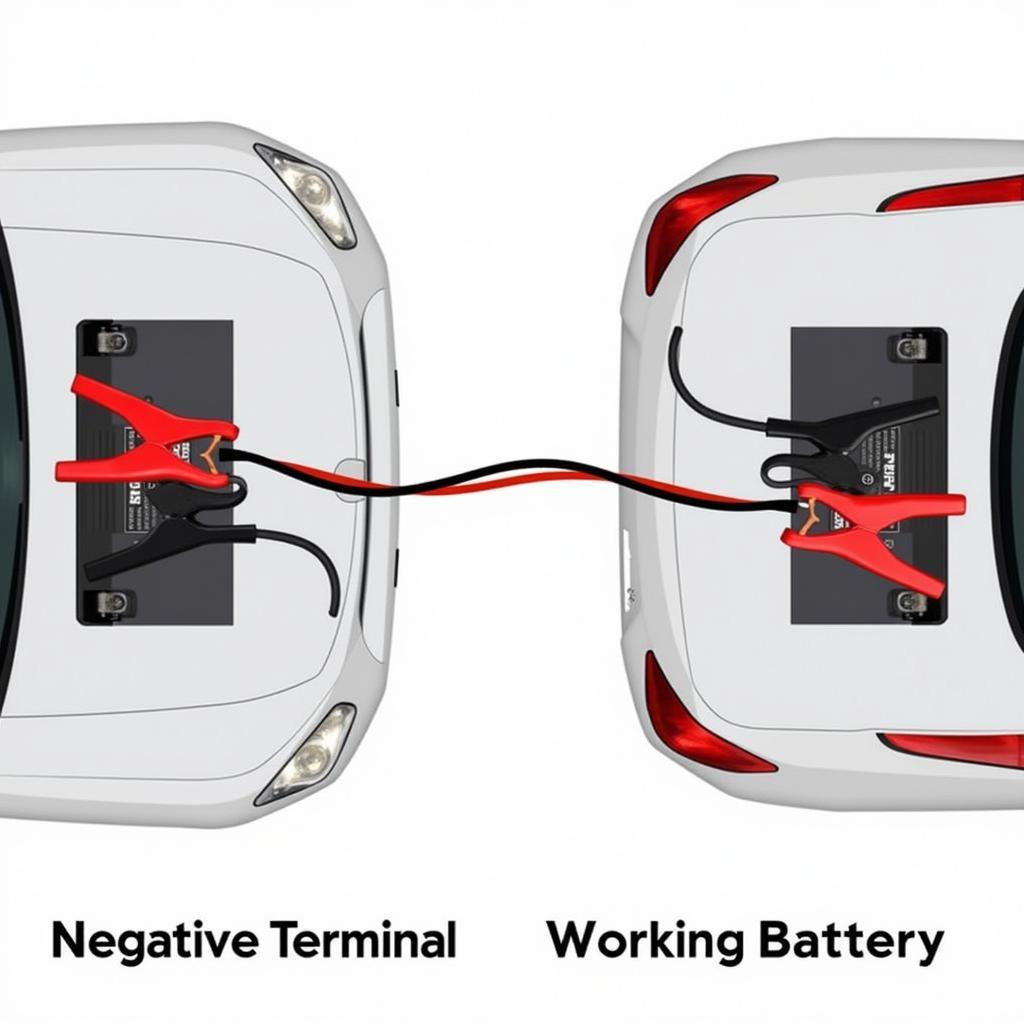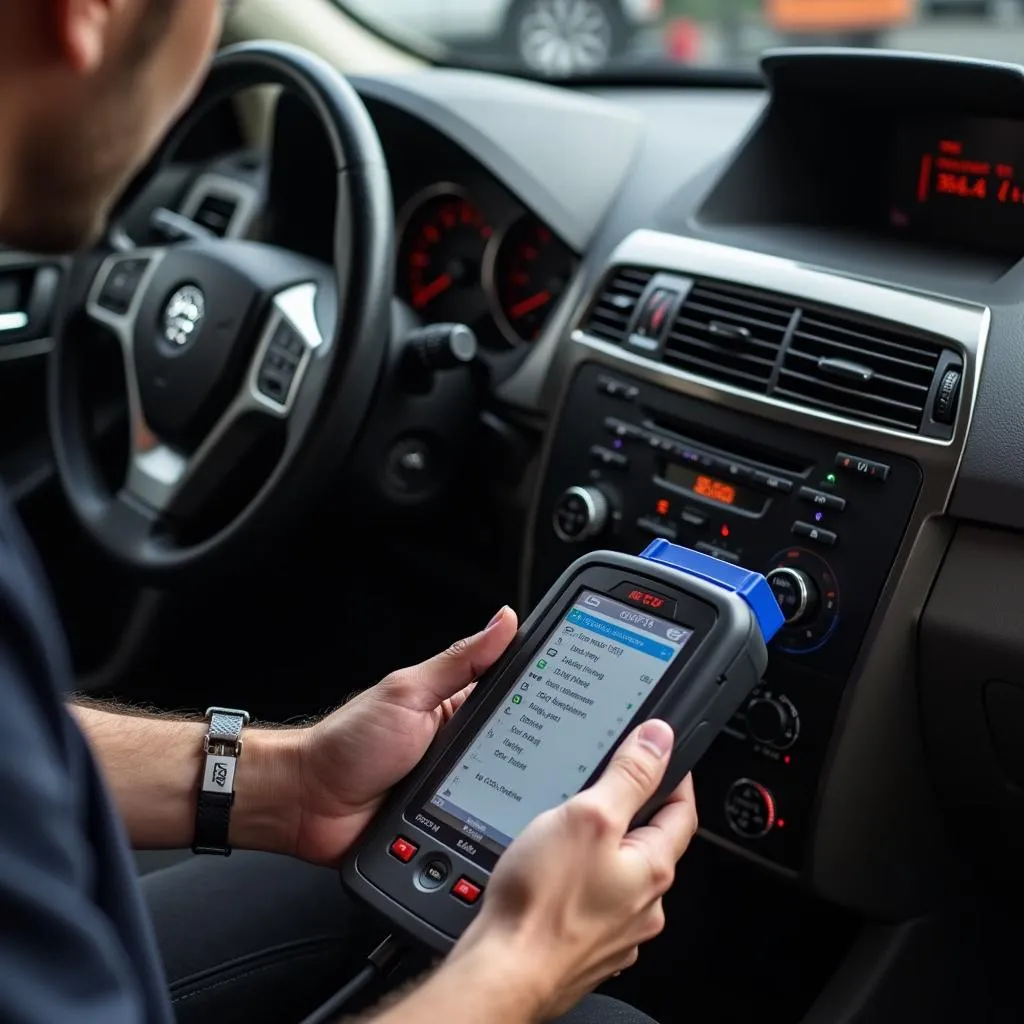A fully discharged car battery can leave you stranded. This article covers the common causes, troubleshooting steps, and solutions for dealing with a dead car battery, from jump-starting to long-term maintenance. We’ll also delve into preventative measures and when it’s time for a replacement.
Why is My Car Battery Fully Discharged?
Several factors can contribute to a fully discharged car battery. From leaving your lights on overnight to extreme temperatures, understanding the root cause is the first step to finding a solution. Sometimes, the problem isn’t the battery itself but a related component.
Common Culprits Behind a Dead Battery
- Parasitic Drain: Even when your car is off, certain systems like the clock, radio memory, and alarm system draw a small amount of power. A faulty component or wiring issue can cause excessive drain, leading to a fully discharged battery.
- Leaving Lights or Electronics On: Accidentally leaving your headlights, interior lights, or other electronics on can quickly deplete your battery, especially older ones.
- Extreme Temperatures: Both extreme heat and cold can affect battery performance. Heat can accelerate the chemical reactions inside the battery, shortening its lifespan. Cold can slow down these reactions, making it harder for the battery to provide enough power to start your engine.
- Old Age: Like any other component, car batteries have a limited lifespan. Typically, they last between three to five years. As a battery ages, its capacity to hold a charge diminishes, making it more susceptible to fully discharging.
- Faulty Alternator: The alternator recharges the battery while the engine is running. A failing alternator won’t charge the battery properly, eventually leading to a complete discharge.
- Short Trips: Short trips don’t allow the alternator enough time to fully recharge the battery after starting the engine, particularly during cold weather when more power is required. Over time, this can lead to a fully discharged battery.
- Corroded Battery Terminals: Corrosion on the battery terminals can disrupt the flow of electricity, preventing the battery from charging properly or discharging sufficient power to start the engine.
Troubleshooting a Fully Discharged Car Battery
So, you’re facing a fully discharged car battery. What do you do? Don’t panic. Here’s a step-by-step guide to help you diagnose the issue.
- Check the Obvious: Ensure you haven’t left any lights or electronics on. This might seem basic, but it’s a surprisingly common cause of a dead battery.
- Inspect the Battery Terminals: Look for any signs of corrosion. White, powdery buildup indicates corrosion and can hinder the battery’s ability to function. If you see corrosion, clean the terminals with a mixture of baking soda and water.
- Try Jump-Starting: If the terminals are clean, try jump-starting the car. If the car starts, it suggests the battery was simply discharged. However, if the car won’t start or starts and then dies quickly, the problem likely lies elsewhere, such as a faulty alternator.
- Test the Alternator: Once the car is running (after a jump-start), disconnect the positive battery cable. If the engine dies, it indicates a problem with the alternator. It’s not recharging the battery.
 Jump Starting a Car Battery
Jump Starting a Car Battery
Solutions and Preventative Measures
Once you’ve identified the cause, here are some solutions and ways to prevent a fully discharged battery in the future:
- Charging the Battery: If the battery is simply discharged, you can charge it using a battery charger. Follow the charger instructions carefully.
- Replacing the Battery: If the battery is old or damaged, it’s time for a replacement. Consider factors like your vehicle’s make and model, driving habits, and climate when choosing a new battery.
- Regular Maintenance: Clean the battery terminals periodically to prevent corrosion. Have your battery and charging system tested annually, especially if your battery is older than three years.
- Limit Short Trips: If possible, combine short trips into longer ones to give the alternator sufficient time to recharge the battery. Or, consider using a battery maintainer if you frequently drive short distances.
Fully Discharged Car Battery: What to Avoid
- Ignoring Warning Signs: Pay attention to any signs of a weakening battery, such as dim headlights or slow engine cranking. Addressing these early signs can prevent a complete discharge.
- Overcharging the Battery: Overcharging can damage the battery and shorten its lifespan. Always use a quality battery charger and follow the manufacturer’s instructions.
- Improper Jump-Starting: Incorrectly connecting jumper cables can damage the electrical systems of both vehicles. Double-check the connections before attempting a jump-start.
2013 buick verano battery problems
Conclusion
A fully discharged car battery can be a frustrating experience. However, by understanding the causes, following the troubleshooting steps, and implementing preventive measures, you can avoid being stranded with a dead battery. Regular maintenance and proactive care are key to a long-lasting, reliable car battery. Don’t let a dead battery ruin your day. Take charge of your car’s electrical health!
FAQ
- How long does it take to charge a fully discharged car battery? It typically takes several hours to fully charge a dead battery using a standard battery charger.
- Can a fully discharged battery be revived? Sometimes. A deeply discharged battery might be able to hold a charge again after a slow charge, but its overall lifespan will likely be reduced.
- How can I tell if my alternator is bad? A common sign of a failing alternator is a battery warning light on the dashboard. Other indicators include dim headlights, flickering interior lights, and unusual noises from the engine compartment.
- How often should I replace my car battery? Most car batteries last between three and five years. It’s best to have your battery tested regularly after three years to assess its health.
- What should I do if my car won’t jump-start? If your car won’t jump-start, the problem could be more serious than just a discharged battery, such as a faulty alternator or starter. It’s best to have a professional mechanic diagnose the issue.
- Is it safe to drive with a fully discharged battery? Driving with a fully discharged battery is not recommended, as it can damage other electrical components.
- Can extreme cold weather cause a battery to completely discharge? Yes, extreme cold can significantly reduce a battery’s ability to hold a charge and deliver power, leading to a full discharge.


